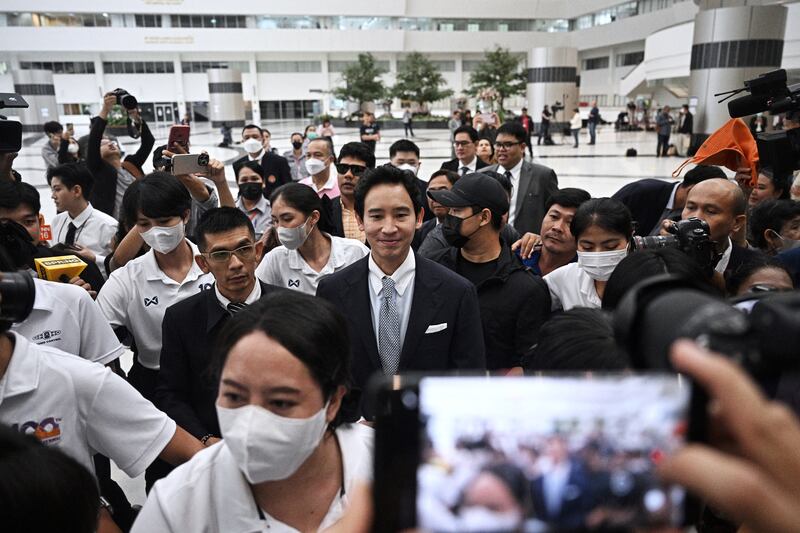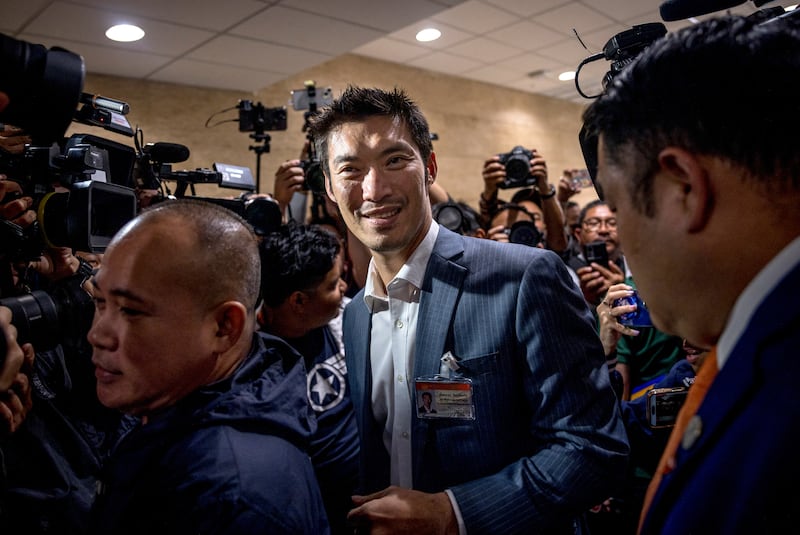The Thai Constitutional Court this week disbanding the progressive Move Forward Party that won the most seats in last year’s election should come as no surprise.
Their ruling found that simply calling for the reform of the harsh law against defaming the monarchy, or any reform of the royal institution through a legal political process is tantamount to attempting to overthrow the constitutional monarchy.
The irony of the military–royalist elite accusing the MFP of trying to overthrow the constitutional monarchy, when it has itself repeatedly overthrown constitutionally and democratically elected governments is hard to take.
Since staging their last coup in 2014 and forcing a regressive constitution on the public, military and royalist elites have used the judiciary as their primary tool to weaken the country’s progressive opposition.
The latest ruling disbanding MFP is just part of their war of judicial attrition.
But the pro-royalists easily managed to thwart MFP’s efforts to make its leader Pita Limjaroenrat prime minister.
The elite was also able to force the inclusion of two military-backed parties into the ruling 11-member coalition government, despite their electoral drubbing.
So what do these forces gain by ensuring MFP is no more?
To attempt to know that, we need to ask three questions: Why did they do it? What happens next? And will it backfire?
Why did they do it?
Dissolving political parties is one of the go-to tools for the royalists.
The military oversaw the dissolution of Thaksin Shinawatra’s Thai Rak Thai Party after the 2006 coup , followed by the 2008 dissolution of its successor, the People’s Power Party.
The court dissolved the Thai Raksa Chart Party ahead of the 2019 election, and Future Forward Party immediately afterwards.
Since 2020, a record number of people – at least 272 –have been arrested on charges of violating the law against defaming the monarchy – Article 112 or lese majeste.
Not all defendants have gone to trial or been convicted. The courts have used restrictive bail conditions to silence many.
Short of a coup, the judiciary is really the only tool that royalist military elites have to blunt progressive voices.
Royalist dominance of the judiciary comes through the Privy Council: two of the 19 members were former presidents of the Constitutional Court, while two others were senior Justice Ministry officials. Ten of the 19 members are former generals.
Since the 2014 coup, several court rulings made any notion of an impartial judiciary laughable – it is the monarchy’s enforcement arm.
What happens next?
Along with the ruling that disbanded MFP, the court also banned from political participation party chief Pita and 10 other party executives.
The remaining MFP parliamentarians – 143 of them – moved en bloc to a newly created People's Party, which was announced Friday. The party elected Nattapong Ruangpanyawut, 37, a computer engineer and heir to a real estate development company, as party leader.
But that does not mean the MFP, or rather, the People's Party, is out of the woods. Some 44 ex-MFP and now People's Party lawmakers are the subject of yet another royalist complaint. They could be looking at a lifetime ban from politics for supporting proposed amendments to the royal defamation law.

Will it backfire?
Dissolving parties and using royal defamation prosecutions haven't always worked in favor of the royalist elites -- in the case of MFP itself.
For instance, dissolving the Future Forward Party in 2020 certainly did not make it go away. It became a new party, MFP (Move Forward), with most of the same people.
And MFP grew stronger than its predecessor.
Future Forward was the third most popular party in the 2019 election, with just under 6.3 million votes, giving it 81 seats in parliament, or 17.3%. Back then, much of its support was concentrated in Bangkok.
Jump ahead four years, and Future Forward’s second iteration Move Forward has grown into a nationwide political force.
It was the largest vote-getter in the 2023 election, winning 151 seats or 38% of the total. That represented an 86% increase.
Move Forward increased its vote share by 130% to 14.4 million votes. It won seats throughout the country, including in the heartland of the dominant Pheu Thai party. MFP also increased its constituency seats to 112 from 31.
While back in 2019, polling suggested that 19% of the electorate wanted Future Forward founder and leader Thanathorn Juangroongruangkit to be prime minister, four years later nearly 31% wanted Move Forward’s leader to become Thailand’s leader.
And since 2023, Move Forward chief Pita’s popularity has surged – more than 40% now prefer him as prime minister.
Pita was only thwarted from becoming the Prime Minister because of a special section in the 2017 Constitution that gave the unelected Senate a direct role in electing the prime minister.

That meant that any party or coalition needed not a simple majority of 251, but a super majority of 376, as the military-appointed Senate was expected to vote en bloc.
Since then, though, the Senate’s six-year term and special privileges have expired, and it has been stripped of the power to elect the PM.
So the question is, could Move Forward’s new incarnation continue their electoral trajectory?
Could they get close to an outright 251-seat majority or put together a fairly tight coalition government by the time the next general election is scheduled to be held no later than May 2027?
Royalist-military elites are betting that it cannot -- that the constant legal setbacks and 10-year bans on their most charismatic leaders will weaken the party’s appeal.
But that kind of thinking ignores the reality of a discernible societal and generational shift in Thailand.
In 2019 there were no calls for monarchy reform.
Today it’s not a fringe issue. Today it is being discussed alongside questions that are being asked about succession and the monarchy’s future.

Prime Minister Srettha Thavisin has his own legal problems and his fate will be decided next week.
His Pheu Thai party anyway jettisoned its reform credentials when it decided to ally with two military-tied parties to lead a coalition government – that burned bridges with its constituents.
The party’s influential leader Thaksin may have returned from exile, but he now has a royal defamation case against him that has put him on a very short leash.
To top it all, Pheu Thai’s policy agenda and economic reforms have fallen flat.
By comparison, Move Forward was an extremely effective party in terms of pushing its legislative agenda even when it was out of government. This is then in stark contrast with even members of the governing coalition.
Move Forward may have suffered a setback, but in the form of People’s Party it will continue to outwork, outperform and push for meaningful political and economic reforms.
Thais voted for change in 2023.
They were thwarted by an unelected institution that serves as a guardian for the interests of royalist military elites.
The Constitutional Court has made a mockery of the norm of judicial independence. There is rule by law, but not rule of law.
The voters won’t forget.
MFP had done a superb job recruiting young and talented members who represent the aspirations of younger and more progressive Thais. People’s Party will continue that.
The only way the party can fight judicial coups is to broaden its base of support.
That would work for the party and the people.
Zachary Abuza is a professor at the National War College in Washington and an adjunct at Georgetown University. The views expressed here are his own and do not reflect the position of the U.S. Department of Defense, the National War College, Georgetown University or BenarNews.
